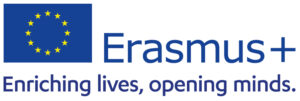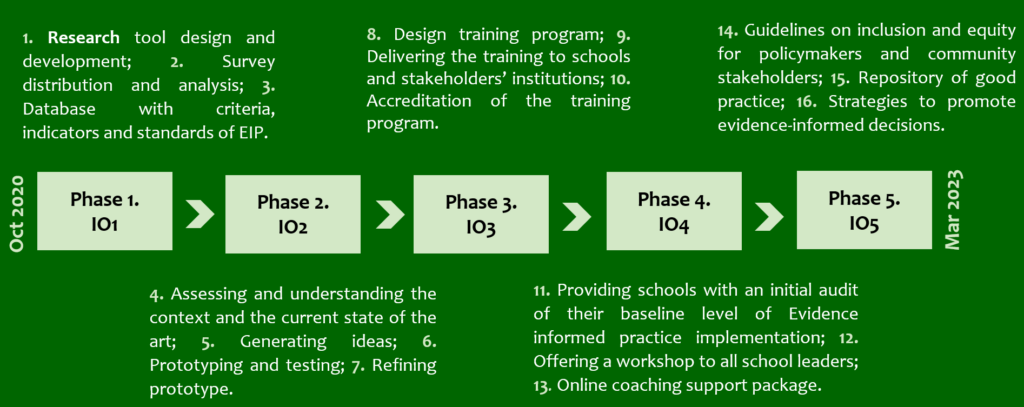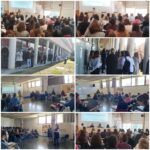The purpose of the project
The project aims to design, prototype and test innovative solutions for teachers and stakeholders (such as Educational counsellors, inspectors, public administrators, delegates) to improve students’ equity and inclusion through the use of evidence-informed practices.
Addressing school inclusion requires of a holistic and interdisciplinary approach, and our consortium is formed by professionals from different area of knowledge and expertise: research, teaching, policymaking, teacher training, coaching, school development, school inspection, psycho/pedagogical and educational counselling from five different countries and three types of institution: higher education, public administration and professional association.

What are we going to do?
To address these priorities, the project proposes a holistic approach, including a 360º Intervention Plan addressing three pillars:
1) teachers’ capacity building;
2) school development; and
3) networks with stakeholders and increasing awareness.
Derived from these three areas of intervention, the project will produce tangible results in five domains by producing five intellectual outputs, including:
- Systematic datasets of criteria and indicators for teachers, school leaders and policymakers on evidence and research-informed practices for school inclusion;
- A database with resources (effective, innovative teaching practices) for diverse classrooms and a digital prototype to engage teachers with quality and validated evidence and to facilitate the creation of multidisciplinary partnerships and networks, as well as an interactive workspace for school cooperation and information packs;
- Training materials for teachers, school leaders and educational counsellors /tutors and education policymakers to tackle school diversity through EIPA;
- School development plan including intervention guidelines, materials and structures;
- European guidelines for policymakers and community stakeholders on how to foster networks and awareness level of evidence-informed decisions in the field of school inclusion and equity.

Target groups
Our target group are high complexity schools, those schools with high numbers of immigrant pupils, special needs children, children with high levels of school mobility and those from poor social- economic family background.
The project involves a methodological strategy to maximize collaboration and co-design to reduce the transfer gap, such as a system of co-leading and mixing teams formed by research and schools’ teachers, inspectors and counsellors. The project will directly involve a pilot sample of 10 high complexity schools in each partner country. In each school an “Impulse groups” will be formed including teachers and leaders responsible with the implementation of EIPI strategies at school level and to develop organizational conditions for its sustainable implementation.
All the countries participating in this project are facing important challenges regarding educational inclusion (migrant and refugee population, socio-economic status, ethnical aspects or special needs). As such, the transnational character of the project provide extremely useful knowledge for all countries involved.

Phases of development
The project is carried out in 5 development phases corresponding to five intellectual outputs (IO).
Phase I, related to IO1
- Examination tool design and development
- Tool validation
- Survey distribution and analysis
- Database with criteria, indicators and standards of EIP
Phase II, related to IO2
- Assessing and understanding the context and the current state
- Generating a number of ideas and reflecting back on all the generated ideas.
- Prototyping and testing as many ideas as possible in a short amount of time with minimal resources
- User testing.
- Refining prototype.
Phase III, related to IO3
- Design training program.
- Selection and construction of “Impulse Groups” in the selected schools and stakeholders.
- Delivering the training for schools and stakeholders’ institutions.
- accreditation of the training program.
Phase IV, related to IO4
- Providing schools with an initial audit of their baseline level of REIP implementation and a diagnostic of potential improvements.
- Offering a workshop to all school leader participants
- Allocating participating school leader a coach who will work with school leader over ten month period.
- Online coaching support package.
Phase V, related to IO5
- Guidelines on inclusion and equity for policymakers and for community stakeholders.
- Repository of good practice.
- Strategies to promote evidence-informed decisions and practices aiming at school inclusion and equity at the community level.
- Guidelines for aligned (institutional) Equality plans for schools, local and national authorities
- Validation and testing of the guidelines and action plans with users.
The picture below shows how the above-mentioned phases are distributed in the project timeline (October 2020- March 2023)

Project details
Funding Entity: European Commission (Erasmus+ KA2)
Project coordinator: CRiEDO- Centre de Recerca i Estudis pel Desenvolupament Organitzatiu (Universitat Autònoma de Barcelona- Spain)
Project number: 2020-1-ES01-KA201-082328
Duration: October 2020 to March 2023
Total budget: 371.181,00 €




